There are three BEC exams - BEC Preliminary, BEC Vantage and BEC Higher - which test English language ability used in the context of business. They are ideal if you are preparing for a career in business.
The BEC exams are linked to the Council of Europe's Common European Framework of Reference for Languages, and to the UK Qualifications and Curriculum Authority's National Standards for Literacy, within the National Qualifications Framework (NQF).
Why take BEC?
More than ever, a good knowledge of English is needed to succeed in international business and commerce. If you can show you have relevant language skills you'll have a great advantage in the jobs market and much greater flexibility if you want to work abroad.
An internationally recognised business qualification can help you show that you have learned English to an appropriate standard and can use it in a professional context.
What does the exam involve?
BEC Preliminary
Reading and Writing (1 hour 30 minutes)
In the Reading part there are seven tasks of the following types: multiple choice, matching, Right/Wrong/Doesn't Say, multiple choice gap-filling and form-filling. The Reading part is 25% of the total marks.
In the Writing part there are two tasks, both compulsory. Candidates produce a piece of internal company communication (approx. 30-40 words), and a piece of business communication (based on Reading input, approx. 60-80 words). The Writing part is 25% of the total marks.
Listening (approx. 40 minutes)
In the Listening component there are four tasks of the following types: multiple choice, gap-filling and form-filling. Texts used are monologues and dialogues, including interviews, discussions, telephone conversations and messages. The Listening paper is 25% of the total marks.
Speaking (approx. 12 minutes per pair of candidates)
The Speaking Test is conducted by two external examiners and candidates are tested in pairs. At centres with an uneven number of candidates, the last single candidate is examined with the last pair in a group of three. (N.B. The group of three format may only be used to deal with uneven numbers, unexpected absence of candidates, illness, etc. It is not an option that may be selected in normal circumstances where there is an even number of candidates at a session.)
During the test each candidate responds to questions, gives a 'mini-presentation' lasting approximately one minute, takes part in a collaborative task with the other candidate and takes part in a discussion with the other candidate and the interlocutor. The Speaking Test is 25% of the total marks.
BEC Vantage
Reading (1 hour)
In the Reading paper there are five tasks of the following types: multiple choice, matching, sentence level gap-filling, multiple choice gap-filling and error identification. The Reading paper is 25% of the total marks.
Writing (45 minutes)
In the Writing paper there are two tasks, both compulsory. Candidates produce a piece of internal company communication (approx. 40-50 words), and a short report, proposal or piece of business correspondence (based on Reading input, approx. 120-140 words). The Writing paper is 25% of the total marks.
Listening (approx. 40 minutes)
In the Listening paper there are three tasks of the following types: gap-filling or note completion, matching and multiple choice. Texts used are monologues and dialogues, including interviews, discussions, telephone conversations and messages. The Listening paper is 25% of the total marks.
Speaking (approx. 14 minutes per pair of candidates)
The Speaking Test is conducted by two external examiners and candidates are tested in pairs. At centres with an uneven number of candidates, the last single candidate is examined with the last pair in a group of three. (N.B. The group of three format may only be used to deal with uneven numbers, unexpected absence of candidates, illness, etc. It is not an option that may be selected in normal circumstances where there is an even number of candidates at a session.)
During the test each candidate responds to questions, gives a 'mini-presentation' lasting approximately one minute, takes part in a collaborative task with the other candidate and takes part in a discussion with the other candidate and the interlocutor. The Speaking Test is 25% of the total marks.
BEC Higher
Reading (1 hour)
In the Reading paper there are six tasks of the following types: multiple choice, matching, word level gap-filling, sentence level gap-filling, multiple choice gap-filling and error identification. The Reading paper is 25% of the total marks.
Writing (1 hour 10 minutes)
In the Writing paper there are two tasks. In Part One candidates produce a short report (based on graphic input, approx. 120-140 words). In Part Two candidates choose whether to write a report, proposal or piece of business correspondence. The Writing paper is 25% of the total marks.
Listening (approx. 40 minutes)
In the Listening paper there are three tasks of the following types: gap-filling or note completion, matching and multiple choice. Texts used are monologues and dialogues, including interviews, discussions, telephone conversations and messages. The Listening paper is 25% of the total marks.
Speaking (approx. 16 minutes per pair of candidates)
The Speaking Test is conducted by two external examiners and candidates are tested in pairs. At centres with an uneven number of candidates, the last single candidate is examined with the last pair in a group of three. (N.B. The group of three format may only be used to deal with uneven numbers, unexpected absence of candidates, illness, etc. It is not an option that may be selected in normal circumstances where there is an even number of candidates at a session.)
During the test each candidate responds to questions, gives a 'mini-presentation' lasting approximately one minute, takes part in a collaborative task with the other candidate and takes part in a discussion with the other candidate and the interlocutor. The Speaking Test is 25% of the total marks.
viernes, 30 de marzo de 2007
Suscribirse a:
Enviar comentarios (Atom)
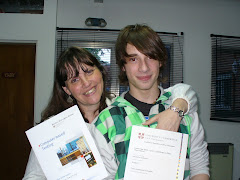
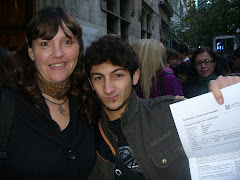
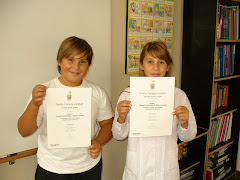
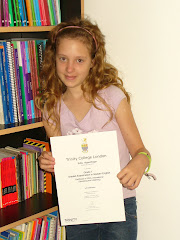

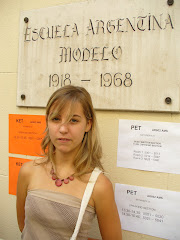


No hay comentarios:
Publicar un comentario